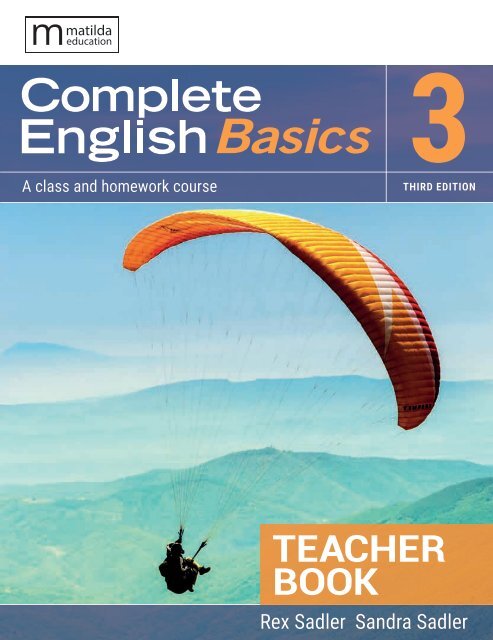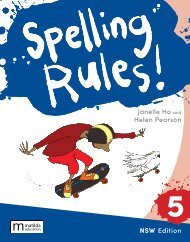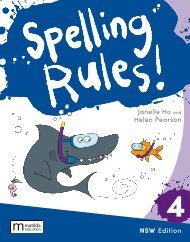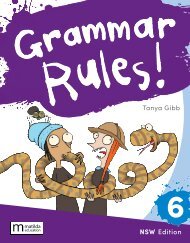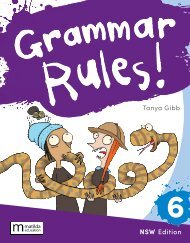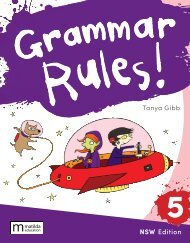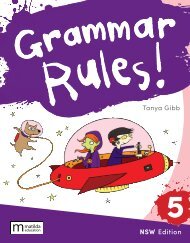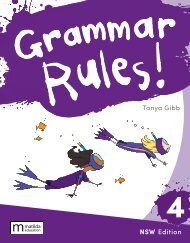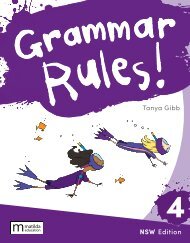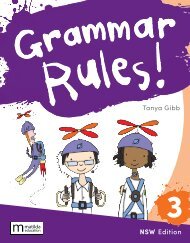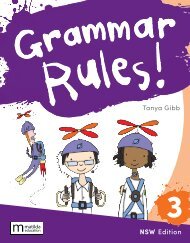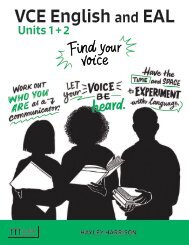Complete English Basics Teacher Book 3
Complete English Basics is a workbook designed to support junior to middle secondary students with essential language and literacy skills. Highly structured units are organised into sections on comprehension, spelling and vocabulary, language, punctuation and writing, making the book ideal for both classwork and homework. Exercises are contextualised through high-interest topics that will fully engage students' attention. The book also features a wide variety of activity types clear, concise explanations of grammar and punctuation rules sequential development of language skills. This third edition includes additional content on writing, updated extracts and a new design. It also includes additional worksheets, plus answers, accessed via the digital download code in each Teacher Book in the categories: Literature, Spelling and Vocabulary, Language, and The Craft of Writing, mimicking the structure of the print books.
Complete English Basics is a workbook designed to support junior to middle secondary students with essential language and literacy skills. Highly structured units are organised into sections on comprehension, spelling and vocabulary, language, punctuation and writing, making the book ideal for both classwork and homework. Exercises are contextualised through high-interest topics that will fully engage students' attention. The book also features a wide variety of activity types clear, concise explanations of grammar and punctuation rules sequential development of language skills. This third edition includes additional content on writing, updated extracts and a new design. It also includes additional worksheets, plus answers, accessed via the digital download code in each Teacher Book in the categories: Literature, Spelling and Vocabulary, Language, and The Craft of Writing, mimicking the structure of the print books.
Create successful ePaper yourself
Turn your PDF publications into a flip-book with our unique Google optimized e-Paper software.
3<br />
A class and homework course<br />
THIRD EDITION<br />
TEACHER<br />
BOOK<br />
Rex Sadler Sandra Sadler
3<br />
A class and homework course<br />
THIRD EDITION<br />
TEACHER<br />
BOOK<br />
Rex Sadler Sandra Sadler
This edition published in 2021 by<br />
Matilda Education Australia, an imprint<br />
of Meanwhile Education Pty Ltd<br />
Level 1/274 Brunswick St<br />
Fitzroy, Victoria Australia 3065<br />
T: 1300 277 235<br />
E: customersupport@matildaed.com.au<br />
www.matildaeducation.com.au<br />
First edition published in 2008 by Macmillan Science and Education Australia Pty Ltd<br />
Copyright © Rex Sadler and Sandra Sadler 2008, 2011, 2017<br />
The moral rights of the author have been asserted.<br />
All rights reserved.<br />
Except under the conditions described in the<br />
Copyright Act 1968 of Australia (the Act) and subsequent amendments,<br />
no part of this publication may be reproduced,<br />
stored in a retrieval system, or transmitted in any form or by any means,<br />
electronic, mechanical, photocopying, recording or othervwise,<br />
without the prior written permission of the copyright owner.<br />
Educational institutions copying any part of this book<br />
for educational purposes under the Act must be covered by a<br />
Copyright Agency Limited (CAL) licence for educational institutions<br />
and must have given a remuneration notice to CAL.<br />
Licence restrictions must be adhered to. For details of the CAL licence contact:<br />
Copyright Agency Limited, Level 11, 66 Goulburn Street, Sydney, NSW 2000.<br />
Telephone: (02) 9394 7600. Facsimile: (02) 9394 7601. Email: memberservices@copyright.com.au<br />
Publication data<br />
Authors: Rex Sadler and Sandra Sadler<br />
Title: <strong>Complete</strong> <strong>English</strong> <strong>Basics</strong> 3 <strong>Teacher</strong> <strong>Book</strong>: A Class and Homework Course<br />
ISBN: 978 1 4202 3714 6<br />
Publisher: Emma Cooper<br />
Project editor: Barbara Delissen<br />
Cover and text designer: Dim Frangoulis<br />
Production control: Janine Biderman and Katherine Fullagar<br />
Photo research and permissions clearance: Annthea Lewis and Vanessa Roberts<br />
Typeset in Heuristica Regular 10.5/12pt by DiZign Pty Ltd<br />
Cover image: Shutterstock/Aurelien Laforet<br />
Printed in by <br />
1 2 3 4 5 6 7 25 24 23 22 21 20<br />
Warning: It is recommended that Aboriginal and Torres Strait Islander peoples exercise caution<br />
when viewing this publication as it may contain images of deceased persons.
Contents<br />
Prefacevii<br />
Acknowledgementsviii<br />
1 It’s my life 1<br />
Comprehension Lone sailor 1<br />
Head honcho school captain 3<br />
Spelling and vocabulary Being human 5<br />
Language Texts 6<br />
Texts and their purposes 7<br />
The craft of writing Personal experiences 8<br />
2 Intertextuality9<br />
Comprehension Novel 9<br />
Cartoon 11<br />
Movie still 12<br />
Spelling and vocabulary Confusing pairs 13<br />
Language Active and passive voice 14<br />
The craft of writing Creating imaginary characters 16<br />
3 Future shock 17<br />
Comprehension Holocaust 17<br />
Spelling and vocabulary The world at war 19<br />
Language Tone 20<br />
Purpose and tone 21<br />
The craft of writing Making the beginning interesting 22<br />
4 Aboriginal voices 23<br />
Comprehension Trails 23<br />
Son of mine 24<br />
Spelling and vocabulary Culture and country 25<br />
Language Relative pronouns 27<br />
Adjectival clauses 27<br />
The craft of writing Writing persuasive arguments 30<br />
5 Journeys in time 31<br />
Comprehension The last days of Pompeii 31<br />
Spelling and vocabulary Through the ages 34<br />
Language Nouns 36<br />
Common and proper nouns 36<br />
The craft of writing Writing a biography of an interesting person 38<br />
978 1 4202 3714 6<br />
iii
iv Contents<br />
978 1 4202 3714 6<br />
6 Dear Diary 39<br />
Comprehension The diary of a young girl 39<br />
Spelling and vocabulary The eye of the beholder 41<br />
Language Collective nouns 43<br />
The craft of writing Writing fictional diaries 44<br />
7 Passport to adventure 45<br />
Comprehension Encounter with a python 45<br />
Spelling and vocabulary Survival 47<br />
Language Abstract nouns 48<br />
The craft of writing Characters in conflict 49<br />
8 Interesting people 51<br />
Comprehension Atticus Finch 51<br />
The Murdstones 52<br />
Miss Honey vs. Miss Trunchbull 53<br />
My da’s hands 54<br />
Spelling and vocabulary Human nature 55<br />
Language Adjectives 56<br />
The craft of writing Being a good observer 57<br />
9 Oh! Horror! 59<br />
Comprehension A meeting with Count Dracula 59<br />
Spelling and vocabulary Creature features 61<br />
Language Using adjectives 62<br />
The craft of writing Using the setting to build suspense 64<br />
10 Survival65<br />
Comprehension Alone in the wilderness 65<br />
Spelling and vocabulary Keeping fit 67<br />
Language Verbs 68<br />
The craft of writing Using verbs to create action 70<br />
11 Relationships71<br />
Comprehension A surfing encounter 71<br />
Spelling and vocabulary Views of life 73<br />
Language Jargon 74<br />
Clichés 75<br />
The craft of writing Dialogue 76<br />
12 On the job 77<br />
Comprehension Dangerous work 77<br />
Spelling and vocabulary Getting a job 79<br />
Language Adverbs 80<br />
The craft of writing Variety in sentence length 82
978 1 4202 3714 6 Contents<br />
v<br />
13 Poetry in action 83<br />
Comprehension The last tiger 83<br />
The shark 85<br />
The eagle 86<br />
Spelling and vocabulary Appreciating poetry 87<br />
Language Poetic techniques 88<br />
The craft of writing Personas and monologues 90<br />
14 Science fiction 91<br />
Comprehension The war of the worlds 91<br />
Spelling and vocabulary In a galaxy far away 93<br />
Language Personal pronouns 95<br />
The craft of writing First person narrative 96<br />
15 Making a living 97<br />
Comprehension The great pearl 97<br />
Spelling and vocabulary If I were a millionaire 99<br />
Language Prepositions 100<br />
The craft of writing Setting 102<br />
16 Media 103<br />
Comprehension Advertising 103<br />
Spelling and vocabulary Media matters 105<br />
Language Persuasive advertising 107<br />
Imperatives in advertising 108<br />
Adjectives in advertising 108<br />
The craft of writing Creating your own advertisement 110<br />
17 Saving the planet 111<br />
Comprehension Endangered species 111<br />
Spelling and vocabulary The environment 113<br />
Language Words and meanings 115<br />
The craft of writing Features of an exposition 117<br />
18 In the laboratory 119<br />
Comprehension The discovery of penicillin 119<br />
Spelling and vocabulary Scientifically speaking 121<br />
Language Synonyms 122<br />
The craft of writing Writing an information report 124<br />
19 I spy 125<br />
Comprehension James Bond 007 125<br />
Spelling and vocabulary All about spies 127<br />
Language Antonyms 128<br />
The craft of writing Naming characters 129
vi Contents<br />
978 1 4202 3714 6<br />
20 Speaking out 131<br />
Comprehension The power of speech 131<br />
Spelling and vocabulary Speakers and listeners 133<br />
Language Word choice 134<br />
Euphemism 135<br />
The craft of writing Writing and presenting a speech 135<br />
21 This land 137<br />
Comprehension Water skier 137<br />
Spelling and vocabulary My country 139<br />
Language Communication breakdown 140<br />
Ambiguity 140<br />
Circumlocution and verbosity 141<br />
The craft of writing Stream of consciousness 142<br />
22 The five senses 143<br />
Comprehension The great tide pool 143<br />
Spelling and vocabulary Sight Sound Taste Smell Touch 145<br />
Language Revision 147<br />
The craft of writing Using the senses 148<br />
Back-of-the-book dictionary 149
Preface<br />
<strong>Complete</strong> <strong>English</strong> <strong>Basics</strong> 3 sets out to present essential <strong>English</strong> skills in an interesting and<br />
meaningful way for middle secondary students.<br />
This third edition covers essential language and literacy skills underpinning the new<br />
Australian Curriculum. New literature texts and language exercises have been included to provide<br />
a wider range of comprehension texts and to augment language development.<br />
The workbook can be used as a class or homework text. One approach would be to have<br />
students complete each unit over a two-week period.<br />
The stimulus materials and exercises are designed to improve comprehension and vocabulary<br />
skills, as well as language usage and spelling. A special feature is the back-of-the-book dictionary, which<br />
encourages students to expand their vocabulary by looking up the meanings of unfamiliar words.<br />
Correct spelling is essential for good communication. Research has shown that in those<br />
classrooms where teachers are concerned about correct spelling and vocabulary enrichment, the<br />
students’ spelling level improves significantly. It is a good idea, if time allows, to have a brief spelling<br />
test at the end of each unit using the words from the spelling and vocabulary list.<br />
The extracts are engaging and cover a diverse range of topics—from surfing to the<br />
holocaust. A range of genres is represented, including biography, crime, poetry and adventure.<br />
Above all, we hope that students will enjoy their studies as they gain basic <strong>English</strong> skills.<br />
Rex and Sandra Sadler<br />
978 1 4202 3714 6<br />
vii
Acknowledgements<br />
The author and publisher are grateful to the following for permission to reproduce copyright material:<br />
Photographs<br />
Alamy Stock Photo/AF ARCHIVE, 12, 16, 34, 51, 76, 91, /<br />
Atlaspix, 61, /Heritage Image Partnership Ltd, 39, /ITAR-TASS<br />
Photo Agency, 129, /KPA Honorar & Belege, 9, /Moviestore<br />
Collection, 53 (right); A-list Entertainment Pty Ltd, 3; Getty<br />
Images/John W Banagan, 23, /J Countess, 133, /Universal<br />
History Archive, 96; iStock/william87, 5, /aluxum, 30, /Robert<br />
Bergeron, 137, /Ranjan Chari, 136, /Valerie Crafter, 111, /<br />
cre8tive_studios, 99, /Andrey Danilovich, 19, /DonKurto, 131,<br />
/Karen Givens, 83, /Tom Grill, 121, /Ray Hems, 13, /Brett<br />
Hillyard, 71, /Sander Huiberts, 124, /Eric Isselée, 25, 65, /<br />
jgroup, 90, /Shaun Lowe, 64, /Christian Miller, 93, /malivoja,<br />
22, /med_ved, 82, /mountainberryphoto, 47, /mtcurado, 139,<br />
/oneinchpunch, 110, /parfyonov, 45, /PeopleImages, 49, /<br />
Shelly Perry, 41, /Philartphace, 77, /pixdeluxe, 102, /kevinruss,<br />
125, /Jose Antonio Santiso Fernandez, 142, /renaschild, 143,<br />
/Skystorm, 97, /Sufi70, 31, /t-lorien, 105, /alexei_tm, 44, /<br />
Nikolay Titov, 127, /tunart, 8, /uschools, 135, /ZambeziShark,<br />
118, /zanskar, 113; Newspix/News Ltd, 1; Cover image of<br />
Children of the Dust by Louise Lawrence, Random House,<br />
1985, reproduced with permission of Penguin Random House,<br />
17; Shutterstock/calvin au, 24, /Alan Bailey, 55, /baranq,<br />
67, /bikeriderlondon, 73, /cosma, 87, /creativemarc, 57, /<br />
Everett Collection, 38, /GGRIGOROV, 117, /Gyrohype, 59, /<br />
HomeArt, 89 (top), /IM_Photo, 70, /Katrina Leigh, 89 (bottom),<br />
/Matt9122, 85, /Alexander Raths, 119, /REX/Tri Star, 53 (left), /<br />
rokopix, 86, /RossHelen, 79, /sumire8, 145, /Stephen VanHorn,<br />
148.<br />
Other Material<br />
Extract from Lionheart by Jesse Martin, Allen & Unwin, 2000,<br />
reproduced with permission of Allen & Unwin Pty Ltd, 1;<br />
Extract from The Happiest Refugee by Anh Do, Allen & Unwin,<br />
2010, reproduced with permission of Allen & Unwin Pty Ltd,<br />
3; Extract from Whatever You Do, Don’t Run—my adventures<br />
as a Botswana guide by Peter Allison, Allen & Unwin, 2007,<br />
reproduced with permission of Allen & Unwin Pty Ltd, 45-<br />
6; Extract from The Secret Diary of Adrian Mole aged 13 ¾<br />
by Sue Townsend, Curtis Brown UK, 1982, reproduced with<br />
permission of Curtis Brown, 44; Extracts from Dr No by Ian<br />
Fleming, Curtis Brown, 1957, reproduced with permission<br />
of Curtis Brown, 125-6, 130; Extract from The Light Beyond<br />
the Forest by Rosemary Sutcliff, 1980, reproduced with<br />
permission of David Higham and Associates, 16; Extract from<br />
Matilda by Roald Dahl, Penguin <strong>Book</strong>s Ltd, 1988, reproduced<br />
with permission of David Higham and Associates, 53;<br />
Advertisement used with permission from Energy Australia,<br />
103; Extract from King Arthur and the Knights of the Round<br />
Table by Antonia Fraser, first published in the UK by Orion<br />
Children’s <strong>Book</strong>s, an imprint of Hachette Children’s <strong>Book</strong>s,<br />
Carmelite House, 50 Victoria Embankment, London EC4Y 0DZ,<br />
9-10; Poem ‘Trails’ by Eva Johnson, reproduced by permission<br />
of the author, 23; Extract from Lockie Leonard: Scumbuster by<br />
Tim Winton, reproduced with permission by Jenny Darling &<br />
Associates, 71-2; Extract from Everything I Know About Writing<br />
by John Marsden, Pan Macmillan Australia, 1993. Copyright<br />
John Marsden 1993. Reproduced with permission of John<br />
Marsden and Pan Macmillan Australia Pty Ltd, 16; Extract<br />
from Children of the Dust by Louise Lawrence, Random House,<br />
1985, reproduced with permission of Penguin Random House,<br />
17-8; Extract from Looking for Alibrandi by Melina Marchetta,<br />
Penguin <strong>Book</strong>s Australia, 1992, reproduced with permission<br />
by Penguin Australia Pty Ltd, 50; Extract from To Kill a<br />
Mockingbird by Harper Lee. Published by William Heinemann.<br />
Reprinted by permission of The Random House Group Ltd,<br />
51; Extract from Forrest Gump by Winston Groom, 1986 by<br />
Perch Creek Realty & Investment Corp. Used by permission<br />
of Doubleday, an imprint of the Knopf Doubleday Publishing<br />
Group, a division of Penguin Random House LLC. All rights<br />
reserved, 96; Extract from Cider with Rosie by Laurie Lee, 1959.<br />
Published by Chatto & Windus. Reprinted with permission of<br />
The Random House Group Limited, 148; Poem ‘The last tiger’<br />
from Collected Poems for Children by Gareth Owen. Published<br />
by Macmillan, 2000. Copyright Gareth Owen. Reproduced by<br />
permission of the author c/o Rogers, Coleridge & White Ltd.,<br />
20 Powis Mews, London W11 1JN, 83; Cartoon ‘On the Town<br />
with King Arthur’ by Tony Lopes, reproduced with permission<br />
of Stoneytoons.com, 11; Poem ‘Son of mine’ from My People<br />
by Oodgeroo Noonuccal, Wiley UK, 1990. Reproduced with<br />
permission of John Wiley & Sons Ltd, 24.<br />
The author and publisher would like to acknowledge the<br />
following:<br />
Extract from The Kon-Tiki Expedition by Thor Heyerdahl, 1993,<br />
Gyldendal Norsk Forlag, 102; Extract from What it Feels Like,<br />
by Lester Morlang, edited by AJ Jacobs, Harper Collins, 2003,<br />
77; Extract from Hatchet by Gary Paulsen, Macmillan Children’s<br />
<strong>Book</strong>s, 1989, 55-6; Extract from The Pearl by John Steinbeck,<br />
Mandarin Paperbacks, 1948, 97; Poem ‘The shark’ by Edwin<br />
John Pratt, from The Oxford <strong>Book</strong> of Animal Poems, by Michel<br />
Harrison and Christopher Stuart-Clark. Oxford University<br />
Press, 1992, 83; Extract from Of Mice and Men by John<br />
Steinbeck, Penguin, 1937, 76; Extract from Cannery Row by<br />
John Steinbeck, Penguin, 2000, 143-4; Extract from The Diary of<br />
a Young Girl by Anne Frank, edited by Otto H Frank and Mirjam<br />
Pressler, translated by Susan Massotty, Puffin <strong>Book</strong>s, 39; Poem<br />
‘Water skier’ by Thomas W Shapcott, University of Queensland<br />
Press, 137.<br />
While every care has been taken to trace and acknowledge<br />
copyright, the publisher tenders their apologies for any<br />
accidental infringement where copyright has proved<br />
untraceable. They would be pleased to come to a suitable<br />
arrangement with the rightful owner in each case.<br />
viii 978 1 4202 3714 6
It’s my life<br />
1<br />
Comprehension<br />
Read the following passage and answer the questions.<br />
Lone sailor<br />
THE marine life seemed to be a lot more active<br />
in this part of the world. I soon found my first<br />
flying fish lying on deck. I was familiar with these<br />
strange creatures from the trip with Dave and<br />
there I was, on my own, with the small flying fish.<br />
It marked the beginning of the tropics for me.<br />
From then on they got bigger and bigger and the<br />
schools would sense the presence of Lionheart<br />
and take to the air in great numbers. At night I’d<br />
hear a thud followed by a few flickers to indicate<br />
one of the fish had landed on board and was<br />
stranded.<br />
They were cute little fish but I soon came to<br />
hate the noise of one landing on board, for they<br />
played heavily on my conscience. I’d be woken<br />
by the thud of one ramming head-first into the<br />
boat then I’d try to get back to sleep. It just wasn’t<br />
possible. The noise of them flipping about the<br />
deck screamed out to me to get up and throw<br />
them back overboard. It would have been easier<br />
if they died quickly but they flip-flopped away<br />
until the flips became less and less frequent, like<br />
the last gasps of a dying person. I’d fall asleep for<br />
a minute to be woken by another flicker of life. I<br />
couldn’t bear lying there while I knew a fish was<br />
suffering. I usually couldn’t get back to sleep until<br />
I’d got out of bed and thrown it overboard. It got<br />
pretty annoying when it happened three or four<br />
times a night.<br />
Not only could I hear them land, but I could<br />
also smell them. The fresh smell of broken scales<br />
wafted down into the cabin where I could tell if<br />
there was one on board even if it made no noise.<br />
They could be a real problem. One morning I<br />
came out on deck and counted fifteen dead fish<br />
lying about the place: in the reefs of the sails,<br />
jammed beside the life raft and the wall, and<br />
even mixed in with the ropes in the rope bags.<br />
Some were quite large, up to 30 centimetres long.<br />
I tried to cook one once but there were too many<br />
bones and scales. At least I knew it was possible<br />
to eat them in an emergency.<br />
from Lionheart by Jesse Martin<br />
978 1 4202 3714 6<br />
1
2 <strong>Complete</strong> <strong>English</strong> <strong>Basics</strong> 3<br />
978 1 4202 3714 6<br />
Reading for understanding<br />
1 What indication did the narrator have that the marine life was a lot more active in the<br />
part of the world where he was now sailing his yacht Lionheart ?<br />
He found his first flying fish on the deck of his yacht.<br />
2 ‘they got bigger and bigger …’ What evidence does the narrator give in the final<br />
paragraph to show this to be true?<br />
‘Some were quite large, up to 30 centimetres long.’<br />
3 How did the schools of flying fish react to the presence of Lionheart ?<br />
The schools sensed its presence by taking to the air in great numbers.<br />
4 At night, how did the narrator know that a flying fish had landed on his yacht?<br />
The narrator was woken by the thud of flying fish landing on the deck.<br />
5 In the second paragraph, the writer uses sound words (onomatopoeia) to convey the<br />
sound of the movements of the fish. Write down three examples.<br />
thud flipping flip-flopped<br />
(flicker) (screamed) (gasps)<br />
6 ‘I’d try to get back to sleep.’ Why was this not possible?<br />
He felt guilty that the fish would die if he didn’t throw it back.<br />
7 Identify a simile in the second paragraph and explain what comparison is being made.<br />
‘like the last gasps of a dying person’. The flips of the struggling flying fish were like the final<br />
gasps of a dying person.<br />
8 How did the narrator become aware of the presence of a flying fish on the deck even<br />
when it made no noise?<br />
The fresh smell of broken scales wafted down to his cabin.<br />
9 ‘They could be a real problem.’ Why was this so?<br />
The number of stranded fish caused a problem when they got caught up in the sailing<br />
equipment.<br />
10 Why was the narrator not keen to eat the flying fish?<br />
The fish had too many bones and scales.<br />
11 What did you learn about the character of the narrator from this passage?<br />
The narrator was kind-hearted and felt guilty when he heard the fish dying.<br />
11 marks
978 1 4202 3714 6<br />
1 It’s my life 3<br />
Head honcho school captain<br />
ALL through my primary school years I had a<br />
thick Vietnamese accent: ‘Fipteen minat twell<br />
equal tree’. Even though my <strong>English</strong> was getting<br />
better year by year, it was still definitely not as<br />
good as an Aussie kid’s. It didn’t seem to matter<br />
too much as I did well enough academically and<br />
socially, becoming a candidate for school captain<br />
at the end of Year 5.<br />
There were four class captains in the running<br />
to become the big head honcho school captain.<br />
It was a very big deal, and the four of us were to<br />
make a speech in front of the whole school at the<br />
next assembly, to tell everyone why we were the<br />
best candidate for the job. The teacher pulled us<br />
aside and told us that it was okay to get help from<br />
our parents to write this speech, as it was such a<br />
big deal. I went home and said to Mum and Dad,<br />
‘You have to help me write a speech to become<br />
school captain’.<br />
‘Six! Anh needs your help to write his speech.’<br />
Uncle Six had done a couple of years of school<br />
in Australia, and at the time he was the best at<br />
<strong>English</strong> in our whole household, but this didn’t<br />
mean he was any good. Together we wrote my<br />
speech and on the day of the assembly I was<br />
ready to wow the school armed with a migrant’s<br />
second-year <strong>English</strong> speech.<br />
That morning I was first to speak.<br />
‘Hello School Peoples. I am Anh.’<br />
I could hear a few sniggers from the other<br />
classes, but I was determined to go on.<br />
‘I will try for my hardest to be very friendly boy,<br />
and I will always saysing hello to all you school<br />
peoples ...’<br />
Everyone started laughing. The worst thing<br />
was when I looked down, I even saw teachers<br />
laughing. I looked across at my own teacher and<br />
she wasn’t laughing, but I could see her trying not<br />
to laugh!<br />
I was so mad at her. I froze. I didn’t know what<br />
to do. It was almost like time stood still. In that<br />
moment I just totally blanked out and forgot<br />
what to say next.<br />
The only people who weren’t laughing were my<br />
little classmates. They were on my side. Just then<br />
I heard a tiny girl’s voice:<br />
‘C’mon, Anh.’<br />
I looked down and there was Karen, an<br />
11-year-old face full of support. A few of her<br />
friends joined in.<br />
‘Keep going, Anh.’<br />
‘I ... I ... should be school captains because I<br />
want to helping the students ...’<br />
I stood as still as I could, just blanking out<br />
everyone, every noise, every snigger and laugh,<br />
and saying everything that I had to say like a<br />
monotone robot. Soon it was over. Thank God.<br />
My first ever public speaking experience.<br />
I look back on it now and I can’t even blame<br />
people for laughing. Bloody Uncle Six must’ve<br />
skipped the classes where they taught plurals and<br />
adjectives.<br />
from The Happiest Refugee by Anh Do<br />
Reading for understanding<br />
1 What problem did the narrator have because he was a refugee?<br />
He had a heavy Vietnamese accent and didn’t speak <strong>English</strong> as well as other Australian kids.
4 <strong>Complete</strong> <strong>English</strong> <strong>Basics</strong> 3<br />
978 1 4202 3714 6<br />
2 ‘Fipteen minat twell equal tree.’ What was Anh trying to say in <strong>English</strong>?<br />
Fifteen minus twelve equals three.<br />
3 Why did Anh feel he could become a candidate for school captain?<br />
Anh felt he had done well enough academically and socially to be a candidate.<br />
4 What did Anh have to do before he could be chosen for school captain?<br />
He had to make a speech at the next assembly, explaining why he was the best candidate for <br />
school captain.<br />
5 What help was each candidate allowed to have in preparing their speech?<br />
Each candidate was allowed to get help from their parents.<br />
6 Why was Anh’s uncle given the job of helping him prepare his speech?<br />
Anh’s uncle was the best at <strong>English</strong> in Anh’s household.<br />
7 How did Anh feel before he was to give his speech?<br />
He felt very confident and ready to impress the school.<br />
8 ‘Hello School Peoples.’ Why did Anh’s first three words cause sniggers from the other<br />
classes?<br />
These words showed that Anh couldn’t speak <strong>English</strong> correctly.<br />
9 Why was Anh mad at his teacher?<br />
He could see that his teacher was trying to suppress a laugh.<br />
10 How did Anh’s classmates encourage him to continue his speech?<br />
They called out, ‘C’mon, Anh’ and ‘Keep going, Anh’.<br />
11 What caused Anh to speak ‘like a monotone robot?’<br />
People were laughing at him and this was the only way he could complete his speech.<br />
<br />
12 What explanation does Anh give for his use of incorrect <strong>English</strong> in his speech?<br />
He blames his Uncle Six, his speech coach, because he did not understand plurals and <br />
adjectives.<br />
13 What does this incident reveal about Anh’s personality?<br />
It shows that he has a happy, lively personality and had the courage to complete his speech <br />
despite the laughter. He doesn’t blame the audience for laughing. He is also able to see the <br />
humorous aspect of his misfortune.<br />
<br />
13 marks
978 1 4202 3714 6<br />
1 It’s my life 5<br />
Spelling and vocabulary<br />
Being human<br />
optimistic energetic embarrass agreeable loyalty<br />
cautious responsible violent criticise considerate<br />
dependable fortunate friendly sympathetic tolerant<br />
conscious mischievous anxious conceited prejudice<br />
patient impetuous impulse ignorant deceitful<br />
satisfied vitality personal stubborn claustrophobia<br />
Finding opposites<br />
Find words in the spelling list that are opposite in meaning to the following.<br />
The first letters are given to help you.<br />
1 reckless c cautious 6 lazy e energetic<br />
2 pessimistic o optimistic 7 betrayal l loyalty<br />
3 humble c conceited 8 unreliable d dependable<br />
4 praise c criticise 9 educated i ignorant<br />
5 trustworthy d deceitful 10 hostile f friendly<br />
10 marks<br />
Word forms<br />
<strong>Complete</strong> the sentences by using the correct form of the words in brackets.<br />
1 The demonstrators acted impetuously (impetuous), but fortunately<br />
(fortunate) they took responsibility (responsible) for their actions.<br />
2 When the child had regained consciousness (conscious), the doctor advised the<br />
parents to treat the injury cautiously<br />
(cautious).<br />
3 The evidence was prejudicial (prejudice) to the case and the<br />
defendant stated that his impulsive<br />
(impulse) behaviour had been<br />
an embarrassment (embarrass) to his family.<br />
4 All were in agreement (agreeable) that our grandmother had a wonderful<br />
personality (personal) and always patiently (patient) listened to the<br />
problems of others.<br />
5 The principal would not tolerate (tolerant) any violence<br />
(violent) or deceit<br />
(deceitful) from the students.<br />
14 marks
6 <strong>Complete</strong> <strong>English</strong> <strong>Basics</strong> 3<br />
978 1 4202 3714 6<br />
Back-of-the-book dictionary<br />
Claustrophobia is defined as ‘the fear of enclosed spaces’. It is derived<br />
from the Latin word claustrum (enclosed space) and the Greek word<br />
phobos (fear). There are many phobias that humans may suffer from.<br />
Use the back-of-the-book dictionary to write the meanings of these<br />
common phobias.<br />
claustrophobia: a fear of small or enclosed spaces<br />
hydrophobia: a fear of water<br />
noctiphobia: a fear of the night<br />
arachnophobia: a fear of spiders<br />
xenophobia: a fear of foreigners or strangers<br />
acrophobia: a fear of high places<br />
Language<br />
Texts<br />
A text is a spoken, written or visual communication used to convey meaning. Five main categories<br />
of texts can be identified: factual texts, literary texts, visual texts, media texts and everyday texts.<br />
Well-known texts include novels, poems, newspaper articles, films, reviews, jokes, cartoons, comic<br />
strips, advertisements, scripts, diaries, letters, paintings, posters, photographs, brochures and<br />
autobiographies.<br />
Identifying the text<br />
Below are definitions of texts that we come across in our daily lives. Use the list to find the name<br />
that goes with each definition.<br />
autobiography biography atlas newspaper dictionary<br />
thesaurus menu recipe novel film script<br />
email portrait photograph cartoon encyclopaedia<br />
prescription fairytale magazine obituary limerick<br />
epitaph journal review legend street directory<br />
Text<br />
Definition<br />
1 atlas a book of maps<br />
2 email electronic mail<br />
3 dictionary an alphabetical list of words and their meanings<br />
4 limerick a five-line, amusing poem<br />
5 newspaper a paper printed daily or weekly containing news, etc.<br />
6 marks<br />
6 novel a long prose narrative about imaginary people and events
978 1 4202 3714 6<br />
1 It’s my life 7<br />
7 photograph a picture taken by a camera<br />
8 fairytale a story about fairies or magical events<br />
9 portrait a painting, drawing or photograph of a person<br />
10 menu a list of dishes served at a restaurant<br />
11 epitaph the words written on a gravestone<br />
12 autobiography a story written by someone about his or her life<br />
13 encyclopaedia a book of information arranged alphabetically<br />
14 review an article giving an opinion about a film, book, etc.<br />
Texts and their purposes<br />
Creators of a text use language for a purpose. This purpose is the reason why they write.<br />
There are many purposes for writing that you will need to be able to identify. Here are some<br />
of the important ones.<br />
inform persuade entertain record report<br />
clarify evaluate describe criticise change<br />
invite compare reflect respond complain<br />
recount explain thank request enthuse<br />
advertise argue review instruct command<br />
14 marks<br />
Identifying the purpose<br />
Read the following texts. In one sentence, write each writer’s purpose.<br />
1 Come away to sunny Queensland and enjoy the wonders of the Great Barrier Reef.<br />
(advertisement)<br />
Purpose: The advertisement’s aim is to encourage readers to take a Queensland holiday.<br />
2 September 25<br />
Dear Diary,<br />
I haven’t written for about a week because nothing of interest has happened.<br />
The same old dumb teachers teaching the same old dumb subjects in the same old dumb<br />
school. At first I thought high school would be fun, but it’s just dull.<br />
(student diary; from Go Ask Alice, anonymous)<br />
Purpose: The writer is showing her dissatisfaction with high school.<br />
3 She was unbelievably old and so thin that she was more like a skeleton than a living being:<br />
her wrinkled skin hanging from her bones; her face a gleaming skull.<br />
Purpose: The purpose is to describe a very old woman.<br />
(novel; from The Red King, Victor Kelleher)<br />
3 marks
8 <strong>Complete</strong> <strong>English</strong> <strong>Basics</strong> 3<br />
978 1 4202 3714 6<br />
The craft of writing<br />
Personal experiences<br />
Writing is a special craft and it takes hard work—very few gifted<br />
writers claim that writing is easy. Frank McCourt, famous bestselling<br />
author of Angela’s Ashes, ’Tis and <strong>Teacher</strong> Man, gives the<br />
following advice to budding authors who are trying to improve<br />
their writing techniques.<br />
Write about what you know with conviction from the heart. Dig deep. Find your own voice<br />
and dance your own dance.<br />
In the following extract, famous author and journalist Phillip Adams takes this advice as he gives us<br />
a moving description of his grandfather from his childhood memories.<br />
WHEN I think of my grandfather, I see his hands.<br />
In my memory they’re as gnarled as the mallee<br />
roots he’d carry from the wood-heap to the open<br />
fire where he’d have me make toast with a long<br />
fork of plaited wire. Big hands, capable of acts<br />
of extraordinary sensitivity, as when he’d use his<br />
huge forefingers to make holes in his seed beds,<br />
deftly planting the most fragile green filaments.<br />
I can also remember the kindness in those<br />
hands when they’d tousle my hair, or hand me a<br />
crudely made sandwich.<br />
from ‘Grandpa: the gentle giant of my childhood’<br />
by Phillip Adams<br />
Write a one-paragraph description of one of the following people in your life.<br />
• mother • father • brother • sister • enemy<br />
• grandfather • grandmother • friend • bully • dentist
Intertextuality<br />
2<br />
Comprehension<br />
Intertextuality is the connection that some texts have with each other. Texts make connections<br />
through their storylines, settings, themes, contexts, characters and language. A whole text may be<br />
transformed into a modern text, or a text may borrow from or refer to another text. For example,<br />
the teenage romance film 10 Things I Hate About You borrows heavily from Shakespeare’s The<br />
Taming of the Shrew.<br />
A famous story such as the legend of King Arthur may exist in various forms—a movie, poem,<br />
novel, comic strip, cartoon or biography. The three texts that follow are all derived from the<br />
original legend of King Arthur. Read them and answer the questions.<br />
Novel<br />
King Arthur and the Knights of the<br />
Round Table<br />
‘THAT is the strangest sight in the world!’<br />
exclaimed Arthur to Merlin. They were sitting in<br />
a deep embrasure in the castle walls, gazing at<br />
the road which wound up to the castle from the<br />
town. Four ox-carts were struggling along the<br />
road, weighed down by an enormous burden.<br />
‘A Round Table,’ continued the king. ‘Yes, it’s a<br />
huge Round Table.’<br />
Merlin sprang up from his chair and stared out<br />
of the window in great excitement. ‘It must be<br />
the famous Round Table of King Leodegrance!’<br />
he said. ‘This famous table was specially made<br />
to the king’s requirements to hold two hundred<br />
and fifty knights, the flower of Welsh knighthood.<br />
I never thought to see the day when Leodegrance<br />
parted with the Round Table.’ But after a great<br />
deal of reflection, the King of Cameliard had<br />
decided to send the Round Table to Camelot, as<br />
a token of his loyalty to Arthur, and as a wedding<br />
present for his daughter. The days in which<br />
Leodegrance could summon up two hundred and<br />
fifty knights were long since past; the effects of<br />
numerous wars with pagans and chieftains had<br />
been to reduce his chivalry to nearer fifty than<br />
two hundred and fifty. The empty seats at the<br />
table mocked him. He decided to pass the table<br />
on to a younger man.<br />
Arthur received the gift with joy.<br />
‘This table is an inspiration to me,’ he told<br />
Gwenevere and Merlin. ‘You know that it is my<br />
dearest wish to drive the invaders back into the<br />
sea, and extend my kingdom from shore to shore.<br />
I shall found the Fellowship of the Round Table.<br />
Every knight who takes the oath of the Round<br />
Table shall be pledged to dedicate his life to the<br />
service of God, the hammering of his enemies<br />
and the protection of the weak.’<br />
978 1 4202 3714 6<br />
9
10 <strong>Complete</strong> <strong>English</strong> <strong>Basics</strong> 3<br />
978 1 4202 3714 6<br />
Merlin nodded in agreement.<br />
‘The Round Table should stand for all that is<br />
best in chivalry,’ he answered. ‘In the days of<br />
Leodegrance’s prime it stood for high adventure.<br />
There are still many adventures to be had in<br />
Britain today, and many battles to be fought<br />
before the pagans are routed and the evil witches<br />
cast down.’<br />
Between them Arthur and Merlin planned a<br />
triple oath for the Knights of the Round Table.<br />
First to step forward to swear the oath of the<br />
Round Table was Sir Lancelot. As he did so a clap<br />
of thunder resounded through the castle hall,<br />
and the room was plunged in darkness. When<br />
the gloom cleared it could be seen that above<br />
each seat of the Round Table a name was written<br />
in letters of gold. Many of the names were still<br />
unknown to Arthur. Merlin solved the mystery.<br />
‘This miracle shows that God’s blessing is<br />
upon the Round Table,’ explained the wizard. ‘It<br />
will be many years before every place is filled at<br />
the table, for as yet your knighthood does not<br />
number anything like two hundred and fifty. But<br />
in time every place shall be filled.’ Then Merlin<br />
pointed to one seat, above which no name was<br />
written. As he pointed, letters of fire formed over<br />
the seat:<br />
‘No one shall sit here, unless he be the best<br />
knight in all the world.’<br />
‘What can this mean?’ exclaimed the king,<br />
crossing himself.<br />
‘That is the Seat Perilous,’ said the wizard.<br />
‘Even Sir Lancelot may not sit in that seat.’ For<br />
the time being he refused to say more.<br />
Then all the king’s knights took their appointed<br />
places, and swore the triple oath of the Round<br />
Table. Following Sir Lancelot, there was Sir Kay<br />
and Sir Bedevere, Sir Gawaine, Arthur’s proud<br />
nephew, Sir Egremont, Sir Walter, and many<br />
others.<br />
from King Arthur and the Knights of the Round Table<br />
by Antonia Fraser<br />
Reading for understanding<br />
1 What is the novelist’s purpose in the passage?<br />
She aims to show how important the Round Table was for the creation of the Knights of the<br />
Round Table.<br />
2 As the action begins, what are Merlin and King Arthur doing?<br />
From the castle walls they are watching the huge round table being carted up the road into<br />
the castle.<br />
3 What evidence can you find to show that the table was very large and heavy?<br />
The four ox-carts carrying it were struggling under their load.<br />
4 Why had the table been specially made?<br />
It had been specially made to King Leodegrance’s requirements to hold two hundred and fifty<br />
Welsh knights.<br />
5 What was Arthur’s ‘dearest wish’?<br />
Arthur’s dearest wish was to drive the invaders back into the sea and extend his kingdom<br />
from shore to shore.<br />
6 What pledge would each knight, who took the oath of the Round Table, have to make?<br />
Each knight would pledge himself to dedicate his life to the service of God, the hammering of<br />
his enemies and the protection of the weak.
978 1 4202 3714 6<br />
2 Intertextuality 11<br />
7 What happened as Sir Lancelot stepped forward to swear the oath of the Round Table?<br />
A clap of thunder resounded through the castle hall and the room was plunged in darkness.<br />
<br />
8 What could be seen when the gloom cleared?<br />
Above each seat of the Round Table a name was written in letters of gold.<br />
9 What explanation did Merlin give for the miracle that had occurred?<br />
Merlin believed that God had given his blessing to the Round Table.<br />
10 Why were many of the names above the seats at the Round Table unknown to Arthur?<br />
The names referred to a future time. At this point in time, Arthur had no knowledge of many <br />
of the knights that were named. <br />
11 Use the back-of-the-book dictionary to find the meanings of these words:<br />
a embrasure: an opening in a castle wall through which arrows may be shot<br />
b pagans: people who do not belong to any of the world’s major religions<br />
c chivalry: the rules and customs of medieval knighthood<br />
Cartoon<br />
13 marks<br />
Reading for understanding<br />
1 The cartoonist has based the cartoon on the legend of King Arthur. How has he indicated<br />
that the speaker is King Arthur?<br />
The speaker is wearing a crown unlike his fellow knights.<br />
2 What important feature of the Arthurian legend have both the cartoonist and the<br />
novelist focused on?<br />
Both the novelist and the cartoonist have focused on the round table.<br />
3 What is the cartoonist’s purpose?<br />
The cartoonist is trying to create a humorous situation based on the story of the round table<br />
of the knights of King Arthur.
12 <strong>Complete</strong> <strong>English</strong> <strong>Basics</strong> 3<br />
978 1 4202 3714 6<br />
4 How has the cartoonist given the legend a modern setting?<br />
He has transferred the action to a modern-day restaurant. <br />
5 What impression has the cartoonist given of King Arthur’s knights?<br />
By their physical appearance, he has created the impression that they are stupid and weak.<br />
6 What techniques are used to make fun of King Arthur and his knights?<br />
Arthur no longer appears powerful because he is forced to beg a waiter for a round table in <br />
a restaurant full of round tables. His knights no longer appear heroic and are clearly out of <br />
place at the restaurant with their spears and shields.<br />
Movie still<br />
6 marks<br />
Reading for understanding<br />
1 What is the setting?<br />
The setting is a forest. <br />
2 How are King Arthur and his knights different from those in the cartoon?<br />
They appear fit and young and on the alert. <br />
3 Why do you think this would be a good still to promote the movie?<br />
It suggests that the movie would feature much action, adventure and fighting and that the <br />
story is set hundreds of years ago.
978 1 4202 3714 6<br />
2 Intertextuality 13<br />
4 What use is made of light and dark in this shot?<br />
There is a contrast between the light of the sky behind the knights and the darker scene in the<br />
forest. Arthur riding a white horse suggests his rank.<br />
5 Where is King Arthur positioned in this shot? Why has this been done by the director?<br />
King Arthur is in the centre of this shot to suggest that he is the most important character. <br />
Most of the viewer’s attention will be on him.<br />
6 Where is the viewer positioned?<br />
The viewer is positioned below the horsemen. <br />
6 marks<br />
Spelling and vocabulary<br />
Confusing pairs<br />
guerilla desert formerly allowed alley<br />
gorilla dessert formally aloud ally<br />
serial incite gait lute feat<br />
cereal insight gate loot feet<br />
rein illicit vacation loose confident<br />
reign elicit vocation lose confidant<br />
A word for a phrase<br />
Find words in the spelling list that match each of the following definitions. Some letters are<br />
given to help you.<br />
1 the largest type of ape _ g _ o _ r _ i l l _ a<br />
2 permitted _ a l l _ o _ w _ e d_<br />
3 illegal _ i l l _ i _ c _ i _ t<br />
4 in a proper manner _ f _ o _ r m _ _ a l l _ y<br />
5 a narrow street _ a l l _ e y_<br />
6 a person someone trusts _ c _ o _ n _ f i _ d _ a n _ _ t<br />
7 a manner of walking _ g _ a i _ t<br />
8 an understanding _ i _ n _ s i _ g _ h _ t<br />
9 to draw out information _ e _ l i _ c _ i _ t<br />
10 a profession _ v _ o _ c _ a _ t i _ o _ n<br />
11 to mislay _ l _ o _ s e<br />
12 in earlier times _ f _ o _ r m _ e _ r _ l _ y<br />
13 an old stringed instrument _ l _ u _ t e
14 <strong>Complete</strong> <strong>English</strong> <strong>Basics</strong> 3<br />
978 1 4202 3714 6<br />
14 a sandy area of barren country _ d _ e _ s e _ r _ t<br />
15 not tight _ l _ o _ o _ s e<br />
16 parts of the legs _ f _ e e _ t<br />
16 marks<br />
Missing words<br />
Use words from the spelling list to complete the following phrases. The first letters are given to<br />
help you.<br />
1 g guerilla warfare 9 breakfast c cereal<br />
2 amazing i insight 10 stolen l loot<br />
3 down a back a alley 11 annual v vacation<br />
4 two left f feet 12 a queen’s r reign<br />
5 a l loose tooth 13 an impressive f feat<br />
6 i illicit drugs 14 chocolate d dessert<br />
7 to i incite a riot 15 a horse’s r rein<br />
8 a c confident student 16 a d desert island<br />
Back-of-the-book dictionary<br />
16 marks<br />
The word ‘vacation’ comes from the Latin word vaco (vacatum), which<br />
means ‘to be empty, vacant, unoccupied’. If you are on vacation, you are<br />
having a rest from work or school. Use the back-of-the-book dictionary<br />
to write the meanings of these words that are derived from vaco.<br />
evacuate: to leave in order to escape danger<br />
vacuum: a space empty of air or matter<br />
vacant: empty or unoccupied<br />
vacuous: showing lack of intelligence; stupid<br />
vacate: to cease to occupy; to leave empty<br />
5 marks<br />
Language<br />
Active and passive voice<br />
When the subject of a sentence is doing the action, the verb is said to be in the active voice.<br />
King Arthur ruled Britain wisely. (active)<br />
However, when the action is done to the subject, the verb is said to be in the passive voice.<br />
King Arthur was always helped by the wizard Merlin. (passive)<br />
Both the active and passive forms of verbs are used in <strong>English</strong>. Usually, the active voice is<br />
more direct and personal than the passive voice.
978 1 4202 3714 6<br />
2 Intertextuality 15<br />
Changing the subject—active to passive<br />
Rewrite each sentence in the passive voice. The first one is done to help you. Some of the<br />
sentences may have more than one correct answer.<br />
1 Arthur pulled the sword from the stone.<br />
The sword was pulled from the stone by Arthur.<br />
2 The wizard Merlin loved the Lady of the Lake.<br />
The Lady of the Lake was loved by the wizard Merlin.<br />
3 Merlin took Arthur to a magical lake.<br />
Arthur was taken by Merlin to a magical lake.<br />
4 The Lady of the Lake gave Arthur a magic sword called ‘Excalibur’.<br />
Arthur was given a magic sword called ‘Excalibur’ by the Lady of the Lake.<br />
5 Wearing the scabbard of ‘Excalibur’ protected Arthur from being hurt.<br />
Arthur was protected from being hurt by wearing the scabbard of ‘Excalibur’.<br />
6 Arthur instructed Sir Bedevere to throw ‘Excalibur’ into the magic lake.<br />
Sir Bedevere was instructed by Arthur to throw ‘Excalibur’ into the magic lake.<br />
7 Sir Bedevere threw the sword into the lake.<br />
The sword was thrown by Sir Bedevere into the lake.<br />
8 The hand of the Lady of the Lake caught the sword.<br />
The sword was caught by the hand of the Lady of the Lake.<br />
7 marks<br />
Changing the subject—passive to active<br />
Rewrite each sentence in the active voice. The first one is done to help you.<br />
1 Sir Lancelot was loved by Queen Gwenevere.<br />
Queen Gwenevere loved Sir Lancelot.<br />
2 ‘Excalibur’s’ scabbard had been stolen from Arthur by Morgan Le Fay.<br />
Morgan Le Fay had stolen ‘Excalibur’s’ scabbard from Arthur.<br />
3 The royal palace was established by Arthur at Camelot.<br />
Arthur established the royal palace at Camelot.<br />
4 Arthur and Gwenevere were given a huge round table as a wedding present by King<br />
Leodegrance.<br />
King Leodegrance gave Arthur and Gwenevere a huge round table as a wedding present.<br />
5 The Saxons were defeated by the Knights of the Round Table at Mount Badon.<br />
The Knights of the Round Table defeated the Saxons at Mount Badon.<br />
6 The princess in the tower was rescued by one of the knights.<br />
One of the knights rescued the princess in the tower.<br />
7 Arthur’s kingdom was destroyed by the treachery of Mordred.<br />
The treachery of Mordred destroyed Arthur’s kingdom.<br />
6 marks
16 <strong>Complete</strong> <strong>English</strong> <strong>Basics</strong> 3<br />
978 1 4202 3714 6<br />
The craft of writing<br />
Creating imaginary characters<br />
Successful novelist John Marsden has the following advice for writers who want to create<br />
memorable characters.<br />
To make your major characters come to life you must endow them with unique details.<br />
Something about the way they dress, for example? The jewellery they wear? Do they have<br />
tattoos, braces, glasses, facial hair, make-up, painted nails? Is there something odd about<br />
them? Perhaps they wear two watches, or carry a spare pair of socks in their pocket, or wear<br />
a badge with a picture of Big Bird.<br />
Of course it’s in their attitudes, opinions, thoughts, personalities that your characters<br />
will truly express their uniqueness, but the little details of dress and appearance help.<br />
Think about behaviour too. Perhaps you could have a character chewing the back<br />
of their hand whenever they listen to someone, or refusing to speak when they drive, or<br />
irritatingly humming the same tune for weeks on end. These mannerisms are all important<br />
to help the reader think of people as individuals.<br />
from Everything I Know About Writing by John Marsden<br />
In the following detailed description of Sir Lancelot, from her novel The Light beyond the Forest,<br />
writer Rosemary Sutcliff uses techniques that John Marsden advocates.<br />
Now Sir Lancelot of the Lake was an ugly man, with<br />
an ugliness such as women love. His dark face under<br />
the thick badger-streaked hair looked as though it had<br />
been put together in haste, so that the two sides of it<br />
did not match. One side of his mouth was grave with<br />
heavy thought, while the other lifted in joy; one eyebrow<br />
was level as a falcon’s wing and the other flew wild<br />
like a mongrel’s ear. He had lived forty-five summers<br />
and winters in the world, and loved and sorrowed and<br />
triumphed and fought to the utmost, and every joy and<br />
sorrow and striving had set its mark on him.<br />
from The Light Beyond the Forest by Rosemary Sutcliff<br />
Now try to create a fictional character of your own from one of these genres:<br />
• fantasy • science fiction • historical fiction • horror
Future shock<br />
3<br />
Comprehension<br />
Read the following passage and answer the<br />
questions.<br />
Holocaust<br />
SARAH’S whole body was tense and listening.<br />
It was very dark in the room but a faint line<br />
of sunlight showed through the weave of the<br />
blanket at the top of the window. She heard a<br />
rumble in the distance, a great wave of sound<br />
that came sweeping towards her, engulfing<br />
everything in its path, drowning Catherine’s cries.<br />
Sarah blundered towards the fragile edge of light<br />
as the blast struck the house.<br />
Roof tiles smashed and the windows were<br />
blown inward. <strong>Book</strong>s and ornaments and light<br />
fittings crashed and fell in the upstairs rooms. In<br />
the howling darkness the mattress sagged and<br />
the bookcase started to topple. The black human<br />
shape that was Veronica screamed at her to<br />
help. But Sarah was already there, moved by her<br />
instinct, exerting force against force. The blanket<br />
tore at its nails, came loose at one corner. Heat<br />
screamed through the crack. Sarah had one brief<br />
glimpse of devastation, a hurricane of tearing<br />
trees and whirling leaves, the sky gone dark and<br />
lurid with fire, before the wind passed over them<br />
and things sank back into stillness.<br />
Catherine was sobbing beneath the table.<br />
Fragments of glass slipped and fell.<br />
The air was stifling.<br />
‘Is it over?’ Sarah asked.<br />
‘That was just the beginning,’ Veronica said<br />
brutally.<br />
‘We don’t stand a chance!’ Sarah cried.<br />
‘There’s a torch on the mantelpiece!’ Veronica<br />
told her. ‘And the hammer is beside it. I’ll need<br />
some nails too. Hurry up!’<br />
Veronica removed the bookcase and nailed<br />
the blanket back into place. They had to have<br />
something heavier, she said, and between them<br />
they managed to lift the settee on top of the<br />
sideboard. It was made of leather and horsehair<br />
and its carved legs hooked over the back. Sheets<br />
and blankets were jammed into the space<br />
along the top as the next wave of sound came<br />
screaming towards them.<br />
They applied their shoulders, all the strength<br />
they had, to hold the settee in place as the<br />
bombs fell over Bristol and Cardiff, Cheltenham<br />
and Gloucester, and the great winds followed, a<br />
roaring tide of heat and darkness that smashed<br />
like a gigantic fist against the house. Even<br />
through the thickness of the walls Sarah seemed<br />
to see it … hell-bright hues, impressions of<br />
colours that flashed and pulsed, rose and gold<br />
and red-vermilion, impaled on her eyes as the<br />
978 1 4202 3714 6<br />
17


